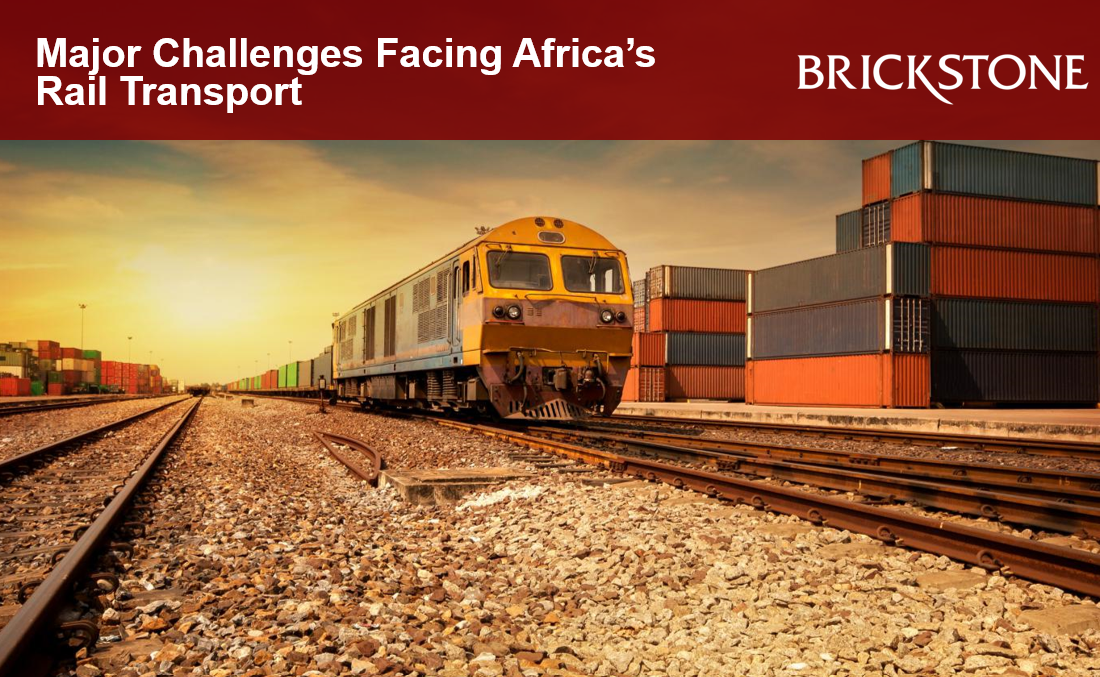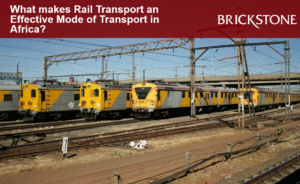Major Challenges Facing Africa’s Rail Transport
Rail transport is the quickest and cheapest method of transporting people and goods in the world. Capable of high levels of passenger and cargo utilisation and energy efficiency, this sector holds the potential to play an important role in accelerating and intensifying trade in Africa, thereby supporting the economic and social development of the continent.
However, Africa’s rail transport is faced with many challenges – ranging from worn out rails, to poor infrastructure, to inadequate funding, to skills shortage, and to absence of a supporting institutional framework – preventing the sector from reaching these prospects.
This article by Brickstone reviews some institutional reports and publications on Africa’s Rail Transport, highlighting key challenges hindering the sector’s growth and development.
Challenges Facing Africa’s Rail Transport
Rail transport, as a result of its energy efficiency, reduced greenhouse gas emissions and lower cost per ton kilometer, is expected to play an increasingly important role in the conveyance of freight over long distances in an energy-efficient and environmentally friendly way. Other advantages of this mode of transportation include but are not limited to – access to capacity, direct access, cost-efficiency, and large capacity.
However, Africa’s rail transport is faced with difficulties and decline of rail in most regions in the continent due to certain challenges. The following are the challenges facing Africa’s rail transport:
Historical Background and Colonial Dominance: According to the AfDB, almost all of the rail systems in Africa have their origins in the early 20th century when European colonial powers built railway lines to support military movements and to transport goods produced in the large mining or farming operations. After the continent achieved independence, railway networks were broken up according to the new national borders, thus in some cases reducing their markets and economies of scale. Public bodies were set up to run railways that soon became inefficient and overstaffed, with dwindling demand due to the competition from road transport and most railways entered a spiral of neglect and decay.
Shortage of Capital to Maintain and Establish New Railways: Existing rail networks in Africa are generally in fairly poor condition and require upgrades to rail infrastructure, stations and rolling stock, as well as network extensions, in order to adequately service passenger and freight demands. However, the renaissance of the railways in Africa will need to be underpinned by the recognition that greater funds are required to bring the infrastructure up to an acceptable level. According to Ntu Edu, New railways in Kenya and Ethiopia have been operating at a loss, with little chance of paying back loans on time from continually elusive operational profits, for instance.
Absence of Interconnectivity: According to Norton, Africa’s rail system is not interconnected. While there may be some major arterial rail links, there is very little incentive to develop branch lines, as it is simply not economically practical to build or operate them. One overall strategy appears to be to develop a standard gauge North/South line, and to develop branch lines that would serve major metropolitan, industrial and natural resource nodes.
Poor Maintenance: There have been numerous transport surveys and strategies that have highlighted the lack of transport and logistics skills generally within Africa. This is of major concern to investors for whom the repair and maintenance of locomotives, rolling stock and rail infrastructure is pivotal to the financial sustainability of any project. Locomotives require very careful monitoring and maintenance schedules, as well as suitably equipped workshops to carry out this process. Consequently most rail projects will require that these facilities and related skills be provided.
Technical Expertise and Power: A further issue facing Africa’s rail transport relating to the maintenance of locomotives and rolling stock is the need for a sufficient pool of skilled labour and technical expertise. It is often necessary to ensure that there are proper plans in place to retain, recruit and/or adequately compensate skilled employees to avoid any delays, increased costs or projects being abandoned. Transport skill migration is a legitimate worry for rail operators. These skills are much sought after, but as a consequence of the inattention paid to rail infrastructure generally, little has been done to maintain a constant supply of employees with these skills.
Read more on challenges facing Africa’s rail transport here.






